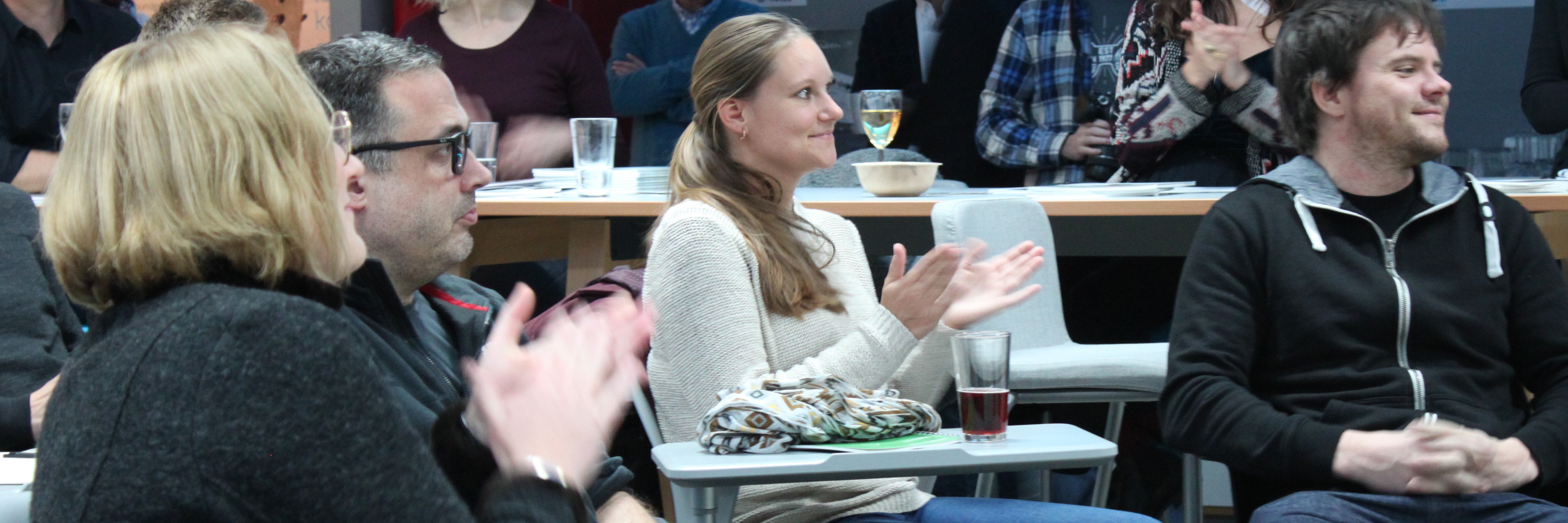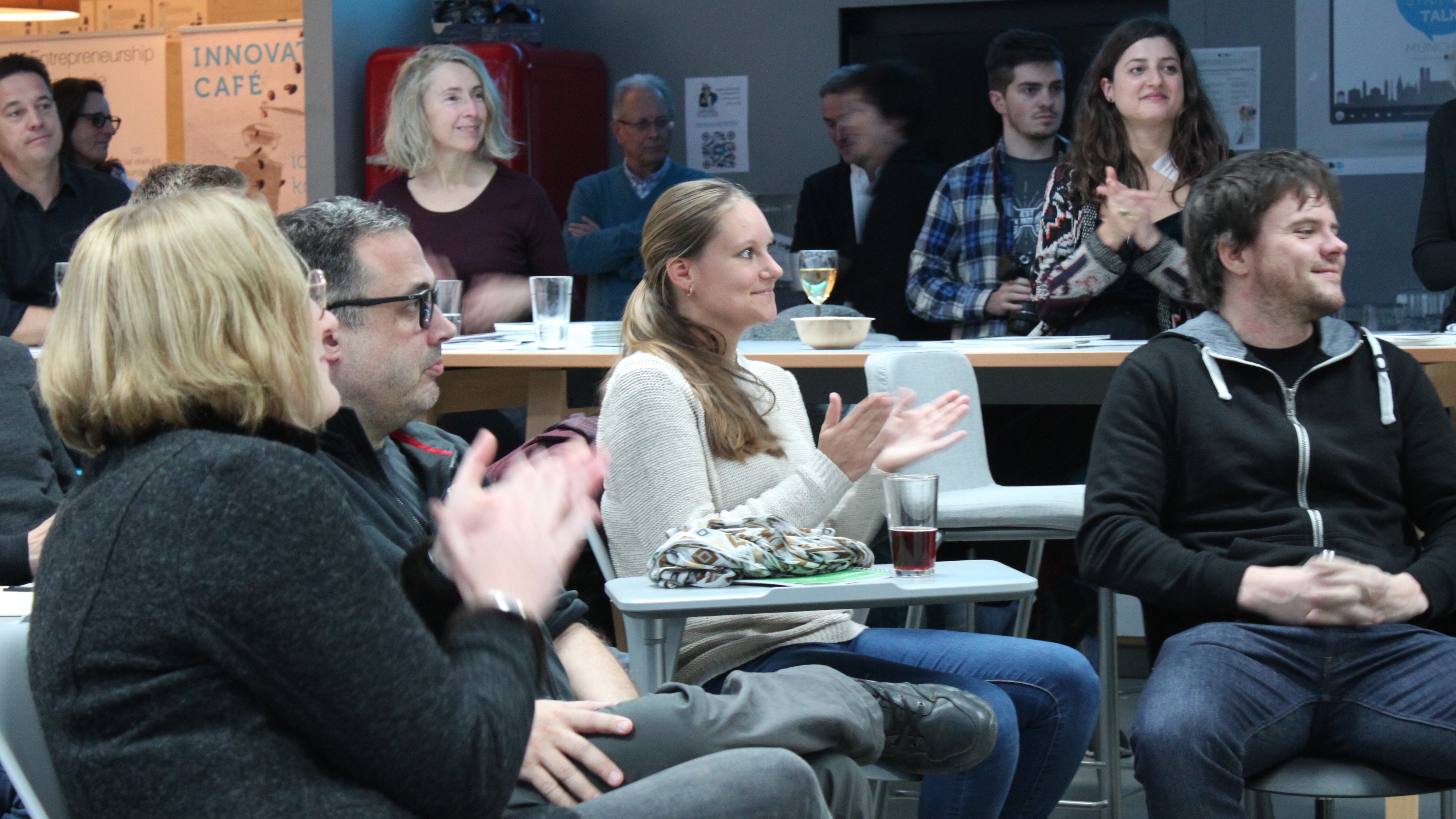
Innovative. Creative. Fair? Chances and risks of the digitalisation
Dialogue Forum special on 14 November 2018
properties.trackTitle
properties.trackSubtitle
Silicon Valley companies dominate the internet and are disrupting traditional business models. Companies that want to be successful in the digital start-up scene need to switch to areas where the internet giants are not yet well positioned. The Special Dialogue Forum at Munich University examined some promising alternatives in this context.

Emotional posts perform better
Frank Rieger, spokesperson from the Chaos Computer Club Hamburg, underlined that digitalisation also has negative social consequences. "Google or Facebook use algorithms with optimisation criteria that do not serve the public interest." More emotionally intense posts are given a better ranking to ensure users stay as long as possible on the social media platforms. "One result of this," he pointed out, "is that parties who operate with hate messages receive the greatest attention on social media during elections."
On the other hand, digitalisation is creating entirely new business opportunities. Munich start-up Usercentrics, for example, supplies companies with software that helps them meet the requirements of the EU's General Data Protection Regulation (GDPR). Managing Director Vinzent Ellissen explained that many companies initially thought that they would not have to make many changes because of the GDPR. But they now have realised that implementing the GDPR is a complex undertaking, and more and more of them are requesting Usercentrics services.
Potential for German start-ups
"The GDPR has made providers of risk capital rethink their approach," Rieger added. There was a preference for funding start-ups that tackled genuine problems, rather than ones whose business idea was based on the tracking of personal data. This field is dominated by the Silicon Valley corporations. The spokesperson from the Chaos Computer Club saw great opportunities in areas that focus on machine data aggregation, optimisation processes, or logistics. He was convinced that there was enormous potential here for Germany as an industrial location, and said he had seen a lot of really exciting business cases. And because the systems we are developing today will shape our everyday lives in the future, the question arises of what position we see people assuming in this world. "Are we simply portable wallets, being presented with as many pretty pictures as possible, or can the internet be used for more practical purposes? I believe we have some alternatives here," said Rieger.
One example is in the sharing economy. "Apps from providers of mobile services allow me to get around without owning my own car," Ellissen acknowledged. "In this case, digitalisation has facilitated a business model that can make the world better." And in general, we should ask ourselves more often whether a planned business model will be of benefit to society.

One of the great opportunities in digitalisation is that it promotes democratisation in many areas. "Nowadays, everyone has access to knowledge via the internet, and it is also much easier to procure financial services." Similarly, collaborative work using the internet represents a huge improvement compared to the days when you sent individual Word documents back and forth by mail.
Legaltech offers great opportunities
Rieger saw the dramatic drop in the cost of establishing a start-up, such as for IT infrastructure, as one of the great blessings of digitalisation. "That is a major driver of the speed of development, because it means you can try things out without any major expense," he said. Ellissen added that the field of Legaltech, in his view, presented one of the biggest opportunities. This sector includes start-ups that simplify the work of lawyers, in the process helping each individual to assert their rights without enormous costs being incurred.
But how should we deal with the power of the market, and the growing influence of the internet giants? Rieger believed education would be of little use here. This is because social media platforms are designed to exploit basic psychological mechanisms, such as confirmation from other people, or curiosity, to ensure that users stay as long as possible. "The human mind is a stationary target for anyone who wants to manipulate it," he pointed out. The only way to combat this, he argued, was to carefully investigate business models that were potentially harmful. And if the conclusion reached was that the manipulative power of individual companies had become too great, we should consider breaking them up.
Tech scene responds
Even in Silicon Valley, there are now signs of the great unease about social media corporations. "Most of my friends there send their children to schools or kindergartens where personal electronic devices are prohibited," Rieger said. The children still work with tablets, but only certain applications are stored on them. "In that way, the children learn that every moment of attention is valuable, and that these devices are created to monopolise attention." Because of its cultural differences and the importance it attaches to data protection, Rieger believed that Germany has good opportunities to develop business models in the field of attention management.
So the idea could gradually gain acceptance that not every digital business model needs to be accepted by society. In the field of environment, it is already accepted that the transformation to the digital world has only just begun. It will be human beings themselves and social acceptance, rather than what it is technologically feasible, that will ultimately determine how successful digitalisation proves.
23 November 2018